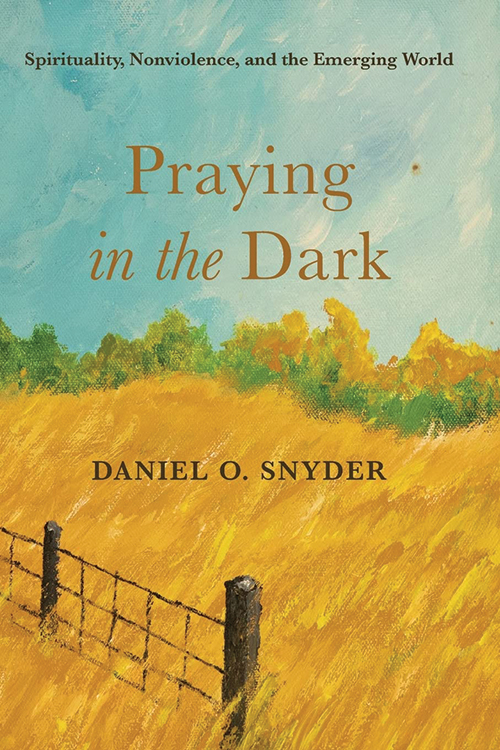
Praying in the Dark: Spirituality, Nonviolence, and the Emerging World
Reviewed by Patricia McBee
August 1, 2023
By Daniel O. Snyder. Cascade Books, 2022. 236 pages. $46/hardcover; $31/paperback or eBook.
I needed this book. I am at a life transition. Where do I focus during the next phase of my life? Turn inward to go deeper? Continue or expand my activism? Continue with an organization which has a “power over” approach to social change?
While he doesn’t exactly answer my questions, Friend Daniel Snyder addresses all this and more in his comprehensive book. His call, he says, “has been to dig deep into theology, depth psychology, and the dynamics of nonviolence, and to then weave these strands together into a spirituality.”
Praying in the Dark explores four major themes. Part 1 centers on prayer and spirituality. Part 2 looks at violence and nonviolence in the light of the contrast between “the domination system” and “the partnership system.” Part 3 calls for a fierce inward activism—drawing on depth psychology, systemic analysis of privilege and oppression, and a theological reflection on those themes. Finally part 4 looks again at the outward focus and suggests that all life can be sacramental, or outward prayer.
Each of these sections could be a book in itself. Each would challenge readers to go deep, open their hearts and minds, examine their assumptions and understandings, and explore the limitations caused by their assumptions. Each reader is invited to slip out of the comfort of those assumptions and go into the spiritual wilderness to discover our oneness with all of creation. “Praying in the dark is a free fall into the wilderness of the heart.”
It is hard to summarize the many themes that Snyder weaves together. A recurring theme is a major cultural assumption within which we live. He cites Riane Eisler’s term “domination system” as referring to “new forms of social organization that arose around five thousand years ago and that created the conditions for the emergence of warfare.” It suppressed and supplanted a “partnership system” that is still found in some cultures, including many Native American cultures. Snyder describes its power today:
The domination system is by now so deeply embedded in the structures of Western consciousness, and in most of the cultural systems around the world, that it masquerades as the essential nature of the universe, divinely ordained, and taken as “commonsense” reality.
In other words, it is so basic to our assumptions and understandings that we don’t question it and mostly don’t even see it, and then it trips us up. Similarly, he cites dualism, introduced by Descartes in the 1600s, that has erected an apparently impenetrable barrier between the inward and outward worlds of human experience. Although we may “cling to the cultural world we’ve learned to inhabit because of its familiar orientation in time and space . . . [giving us] a secure sense of identity,” Snyder suggests that breaking free from this attachment will be rewarded: “if we are willing to risk awakening to an interconnected, relational, ecological world, then the call to a loving partnership world would just make sense.”
He does a deep dive into nonviolence and teases out the differences between a violent peace in which conflict is suppressed; nonviolent conflict that faces and challenges injustice; and nonviolent peace in a partnership world that is alive, fertile, and relational. He takes us to depth psychology to break open the psyche’s depths into greater life and invites us to rethink the theology of domination in which a remote God metes out rewards and punishments.
There is a moving section on pastoral therapy that listens in love. A section on “theodicy” reframes how we understand God’s loving presence in the midst of evil. I found the section on how the domination system has taken over much of Christianity to be sobering. He has a thoughtful section on miracles—they may not be as uncommon as we think. I was humbled by the section about race from a position of privilege, of which Snyder shows keen awareness:
There are multiple, complex, and intersecting social locations involving race, gender, class, age, sexual orientation, gender identity, physical ability, and many more such descriptors that benefit some and exclude others. . . . Whether I want them or not, my social location gives me advantages and benefits every day, and I am spared the indignities and burdens that others suffer.
This book is not specifically directed to a Quaker audience but is firmly based on Snyder’s perspective as a Quaker. It is a personal book; he uses his own experiences to illustrate his points and to show how he has come to his views. He does not assert that his ideas are right for everyone but invites readers to examine and deepen their own ideas. I don’t see everything the way Daniel Snyder does, but I was challenged throughout to figure out what is true for me. What have I learned along the way in life that might open to a better world?
Patricia McBee has been writing and teaching among Friends for more than 50 years. She is a member of Newtown (Pa.) Meeting. Together with her husband, Brad Sheeks, she led Quaker Couple Enrichment retreats for many years. She is a mother, grandmother, and spiritual seeker.



Comments on Friendsjournal.org may be used in the Forum of the print magazine and may be edited for length and clarity.